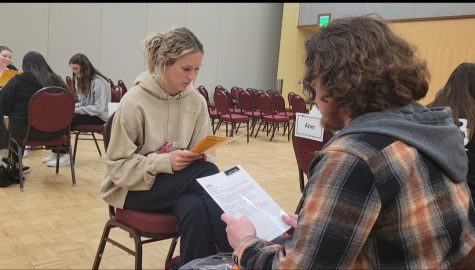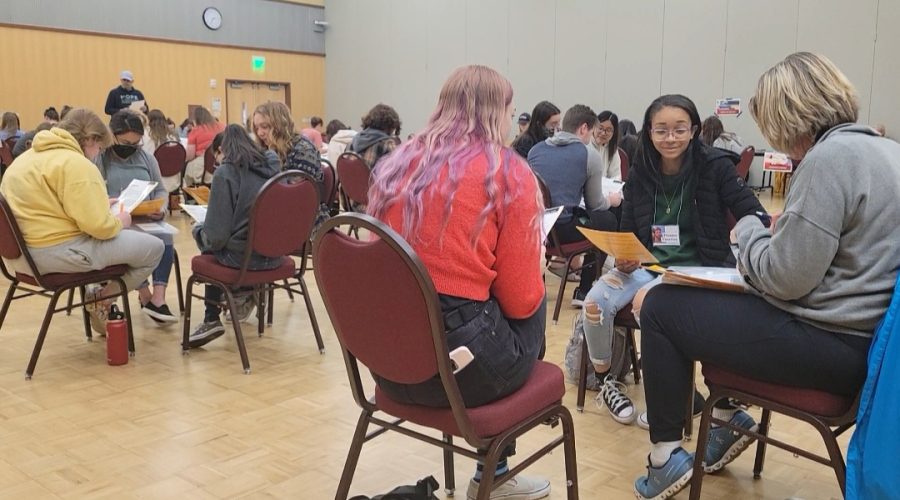Poverty simulation gives students a glimpse into the issues facing millions of people everyday
May 10, 2023
My name is Jack Jolly, and I’m standing in line at Big Dave’s Pawn Shop clutching a box close to my chest. Inside of that box is a flatscreen TV, one of the last nice things that I own after having to pawn my camera the week prior (at half of its market value no less).
I get to the front of the line, where Dave himself tells me he won’t take the TV for any more than $60. I have no choice, I have to make rent. I leave the shop and head back home only to find an eviction notice waiting for me. Before I can do anything, the simulation ends and I’m back to being a staff reporter for The Observer.
While Jack Jolly’s life of poverty may have been a series of simulated events, these challenges are faced by millions everyday. The CWU Family Resource Center put on a poverty simulation in the SURC Ballroom on Friday May 5.
According to Professor of Child Development and Family Science Dr. Sarah Feeney, the purpose of the simulation is to give students in the child development and family science program a bit of insight on what living in poverty is like.
According to Feeney, the simulation was not open to just anyone, as it was a required part of the child development and family science curriculum.
Planning and purpose of the simulation
Feeney was in charge of setting up and running the simulation in the SURC Ballroom. According to Feeney, the goal of the simulation was to instill empathy in participants and understanding of the privileges they have that many others lack.
“One of the biggest goals is empathy,” Feeney said. “Understanding people that might be experiencing economic hardship, what the situation is like, what sort of barriers and challenges they might have and secondly understanding the economic system, how it is set up against them, what are the policies and safety net programs in place and how helpful they actually are.”
According to Feeney, the idea of a poverty simulation was a tool developed by the Missouri Community Action Network in the late ‘90s; the practice has gone through several iterations since, with it currently being in its third iteration.
“[The simulation] is just one of the tools we use in our program to help students develop empathy, compassion and an awareness of the structural systems that keep people from increasing their social mobility,” Feeney said. “In our program, a big part of helping students prepare to work with children and families is helping them understand people that are in situations different to their own.”
When asked in a follow-up if any input from those with a history of experiencing poverty/low-income, Feeney responded that the planning of the simulation included consultation from a few individuals who have themselves experienced poverty and/or come from a low-income background.
“The short answer I’ve settled on for this question is yes,” Feeney said. “I would rather not go into more detail since I haven’t asked permission from everyone who was involved to share information with the media about their personal experiences/background. I also want to emphasize (as I did on Friday) that the simulation isn’t only about being in poverty as defined by the federal poverty line, but also about being in a low-income family (low-income, non-poor, families earn more than the federal poverty line but often struggle to afford basic expenses without some form of assistance).”
While the poverty simulation is meant to be used for educational purposes, there are some who view the idea of acting out other’s lived experiences as offensive. CWU alum S. Moss shared their thoughts on the simulation with The Observer via Instagram.
“It is insulting to try on someone’s lived experiences and just as easily stop trying it on at any time and go back to your more privileged life,” Moss said. “Plus, so many low-income experiences are varied depending on circumstances, it’s not an on/off situation.”
According to Feeney, the goal of the simulation is to educate participants and instill empathy for those living below the poverty level. However, Feeney acknowledges that the poverty simulation may draw a certain amount of criticism and controversy due to the nature of individuals not in poverty playing the role of an impoverished individual.
“We try to be sensitive to people who may have experienced or are still processing the experience of having grown up in poverty or are currently experiencing economic hardships,” Feeney said. “So, students can be given an alternative assignment… we try to make it so we’re not forcing anyone to do the simulation if it makes them uncomfortable.”
Professor and Program Coordinator of Child Development and Family Science Dr. Amy Claridge has participated in past poverty simulations at CWU. Claridge recognized that, while the simulation is a valuable tool in granting perspective, it does have limitations.
“I want to emphasize that we understand the poverty simulation is limited,” Claridge said. “It absolutely does not simulate the real, lived experience of being in poverty. We talk about that so much with our students. I hope that they’re all coming into [the simulation] with the mindset that ‘I really just want to learn and gain some new perspective.’”
The simulation also featured assistance from volunteers from various organizations to run the resource booths, ranging from Kittitas Valley Health Network, Goodwill, the Public Health Department and HopeSource. Learning and Development Specialist from Goodwill Inland Northwest Kaylie Riddoch made another appearance to assist with the simulation after attending the previous year.
“I think it’s a great tool,” Riddoch said. “Especially to help people recognize how we can better make resources available and how we can educate people on what resources are out there for them.”
OPINION: Simulation close-up
When I first arrived at the simulation, I was randomly assigned my role for the day. I would be playing the part of Jack Jolly, a 25-year-old man on probation. I worked a part-time job at a cafeteria and rented a trailer with my girlfriend Joyce Jacobi (real name Peyton Vogel), a single mother to a boy named Josh Jacobi.
The simulation itself was an hour in length, broken down into four 15 minute “weeks” in which we had to navigate our way through various social services and find/maintain jobs in order to meet weekly and monthly living requirements. These requirements ranged from food, clothing, rent and miscellaneous expenses that did not include random circumstances that required additional funds.
Meeting these requirements was incredibly difficult, I was only able to work three days a week at $8.25 an hour. After taxes and support for my own child that I fathered when I was in high school, I was only bringing in roughly $692 a month.
Joyce was even worse off; as a single mother with a one-year-old, she was unemployed and couldn’t look for a job until we had the means to afford care for Josh while we were at work.
The first two weeks were a disaster for Joyce and me. I was required to get a flu shot before I could return to work and since I had no insurance to speak of, I had to pay out of pocket, extra funding we did not have. This left me scrambling between social services and pawn shops trying to come up with a way to afford the flu shot.
Meanwhile, Joyce was out seeking aid for us to be able to afford food and care for Josh (who she had to take along with her to every appointment). All of this running around left us out of the home for most of the time, something a criminal took advantage of as they robbed us blind.
By the end of week two, we had been robbed and forced to sell several belongings just to make ends meet (which we still struggled to do in spite of our efforts) and had our landlord breathing down our necks for rent.
We started to find our feet in week three, having secured my flu shot and government aid. Joyce and I were able to cover the cost of food and begin hunting for jobs (I had lost mine due to missing two weeks of work because of my flu shot) as we headed into week four.
Unfortunately, week four did not go quite as planned. While Joyce and I made our way down the path towards a job interview, we had already been evicted from our home. We managed to scrape together enough money through government assistance and pawning some of our furniture, but the simulation ended before we could challenge the eviction.
For me, the poverty simulation was an eye opening experience. Being placed into the shoes of someone who has to navigate through trials and hardships such as these, even for a moment, was an insightful experience.
With the end of the simulation, I had to say goodbye to Jack Jolly. I may have only gotten a short glimpse into the world real people like Jack live in, but I can say that I will never forget the lessons and perspective I gained from playing his part, lessons and perspectives that many would find valuable.
Wrap up
After the simulation ended, participants gathered into groups to have a debrief about the purpose of the event both in groups and as a collective. Many shared their thoughts and takeaways from the simulation, including fourth year Child Development and Family Sciences major Peyton Vogel.
“I didn’t realize it would be that stressful,” Vogel said. “I thought that it was cool to be able to put [myself] in the spot… it really made me more aware of the amount of resources that are `out there for people as well as hardships, there were so many hardships I didn’t think about.”
Feeney believes the simulation led to new experiences and new perspectives led to learning.
“I think it [led to learning], because it puts students in a situation where they have to navigate lots of different systems,” Feeney said. “They may not have experienced it before and they get exposed to lots of different challenges or barriers and ways of being resilient, ways of being strategic… it gives them a little bit of a taste.”

[/infographic]


Kit • May 13, 2023 at 9:34 pm
So we can simulate poverty for the rich kids on campus but we can’t actually fund housing for the poor kids on campus?
I walked to campus every day in the snow with holes in my shoes to gather cans from the PUSH pantries. I ate 2 items a day. I sold my clothes, and refused to travel home to visit my family on the holidays to save money. I rationed perscription medications to save money. I slept on a pile of clothes for 4 months when I was forced to move into an unfurnished apartment & couldn’t get any furniture or transport it because I couldn’t afford to repair my car. All to get a degree I’ll be paying off for the next 20 years. Screw this.
Ram • May 11, 2023 at 1:50 pm
This is a rich person’s view of poverty. Want the truth? Ask me.